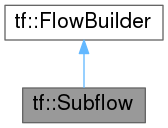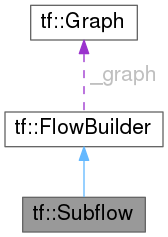 |
Taskflow
3.2.0-Master-Branch
|
 |
Taskflow
3.2.0-Master-Branch
|
class to construct a subflow graph from the execution of a dynamic task More...
#include <flow_builder.hpp>


Public Member Functions | |
| void | join () |
| enables the subflow to join its parent task | |
| void | detach () |
| enables the subflow to detach from its parent task | |
| void | reset () |
| resets the subflow to a clean graph of joinable state | |
| bool | joinable () const noexcept |
| queries if the subflow is joinable | |
| template<typename F , typename... ArgsT> | |
| auto | async (F &&f, ArgsT &&... args) |
| runs a given function asynchronously | |
| template<typename F , typename... ArgsT> | |
| auto | named_async (const std::string &name, F &&f, ArgsT &&... args) |
| runs the given function asynchronously and assigns the task a name | |
| template<typename F , typename... ArgsT> | |
| void | silent_async (F &&f, ArgsT &&... args) |
| similar to tf::Subflow::async but does not return a future object | |
| template<typename F , typename... ArgsT> | |
| void | named_silent_async (const std::string &name, F &&f, ArgsT &&... args) |
| similar to tf::Subflow::named_async but does not return a future object | |
| Executor & | executor () |
| returns the executor that runs this subflow | |
 Public Member Functions inherited from tf::FlowBuilder Public Member Functions inherited from tf::FlowBuilder | |
| FlowBuilder (Graph &graph) | |
| constructs a flow builder with a graph | |
| template<typename C , std::enable_if_t< is_static_task_v< C >, void > * = nullptr> | |
| Task | emplace (C &&callable) |
| creates a static task | |
| template<typename C , std::enable_if_t< is_dynamic_task_v< C >, void > * = nullptr> | |
| Task | emplace (C &&callable) |
| creates a dynamic task | |
| template<typename C , std::enable_if_t< is_condition_task_v< C >, void > * = nullptr> | |
| Task | emplace (C &&callable) |
| creates a condition task | |
| template<typename C , std::enable_if_t< is_multi_condition_task_v< C >, void > * = nullptr> | |
| Task | emplace (C &&callable) |
| creates a multi-condition task | |
| template<typename... C, std::enable_if_t<(sizeof...(C)>1), void > * = nullptr> | |
| auto | emplace (C &&... callables) |
| creates multiple tasks from a list of callable objects | |
| void | erase (Task task) |
| removes a task from a taskflow | |
| template<typename T > | |
| Task | composed_of (T &object) |
| creates a module task for the target object | |
| Task | placeholder () |
| creates a placeholder task | |
| template<typename C , std::enable_if_t< is_cudaflow_task_v< C >, void > * = nullptr> | |
| Task | emplace (C &&callable) |
| creates a cudaFlow task on the caller's GPU device context | |
| template<typename C , typename D , std::enable_if_t< is_cudaflow_task_v< C >, void > * = nullptr> | |
| Task | emplace_on (C &&callable, D &&device) |
| creates a cudaFlow task on the given device | |
| template<typename C , std::enable_if_t< is_syclflow_task_v< C >, void > * = nullptr> | |
| Task | emplace (C &&callable) |
| creates a syclFlow task on the default queue | |
| template<typename C , typename Q , std::enable_if_t< is_syclflow_task_v< C >, void > * = nullptr> | |
| Task | emplace_on (C &&callable, Q &&queue) |
| creates a syclFlow task on the given queue | |
| template<typename C , std::enable_if_t< is_runtime_task_v< C >, void > * = nullptr> | |
| Task | emplace (C &&callable) |
| creates a runtime task | |
| void | linearize (std::vector< Task > &tasks) |
| adds adjacent dependency links to a linear list of tasks | |
| void | linearize (std::initializer_list< Task > tasks) |
| adds adjacent dependency links to a linear list of tasks | |
| template<typename B , typename E , typename C > | |
| Task | for_each (B first, E last, C callable) |
| constructs a STL-styled parallel-for task | |
| template<typename B , typename E , typename S , typename C > | |
| Task | for_each_index (B first, E last, S step, C callable) |
| constructs a parallel-transform task | |
| template<typename B , typename E , typename O , typename C > | |
| Task | transform (B first1, E last1, O d_first, C c) |
| constructs a parallel-transform task | |
| template<typename B1 , typename E1 , typename B2 , typename O , typename C > | |
| Task | transform (B1 first1, E1 last1, B2 first2, O d_first, C c) |
| constructs a parallel-transform task | |
| template<typename B , typename E , typename T , typename O > | |
| Task | reduce (B first, E last, T &init, O bop) |
| constructs a STL-styled parallel-reduce task | |
| template<typename B , typename E , typename T , typename BOP , typename UOP > | |
| Task | transform_reduce (B first, E last, T &init, BOP bop, UOP uop) |
| constructs a STL-styled parallel transform-reduce task | |
| template<typename B , typename E , typename C > | |
| Task | sort (B first, E last, C cmp) |
| constructs a dynamic task to perform STL-styled parallel sort | |
| template<typename B , typename E > | |
| Task | sort (B first, E last) |
constructs a dynamic task to perform STL-styled parallel sort using the std::less<T> comparator, where T is the element type | |
Friends | |
| class | Executor |
| class | FlowBuilder |
| class | Runtime |
Additional Inherited Members | |
 Protected Attributes inherited from tf::FlowBuilder Protected Attributes inherited from tf::FlowBuilder | |
| Graph & | _graph |
| associated graph object | |
class to construct a subflow graph from the execution of a dynamic task
By default, a subflow automatically joins its parent node. You may explicitly join or detach a subflow by calling tf::Subflow::join or tf::Subflow::detach, respectively. The following example creates a taskflow graph that spawns a subflow from the execution of task B, and the subflow contains three tasks, B1, B2, and B3, where B3 runs after B1 and B2.
| auto tf::Subflow::async | ( | F && | f, |
| ArgsT &&... | args | ||
| ) |
runs a given function asynchronously
| F | callable type |
| ArgsT | parameter types |
| f | callable object to call |
| args | parameters to pass to the callable |
The method creates an asynchronous task to launch the given function on the given arguments. The difference to tf::Executor::async is that the created asynchronous task pertains to the subflow. When the subflow joins, all asynchronous tasks created from the subflow are guaranteed to finish before the join. For example:
This method is thread-safe and can be called by multiple tasks in the subflow at the same time.
|
inline |
enables the subflow to detach from its parent task
Performs an immediate action to detach the subflow. Once the subflow is detached, it is considered finished and you may not modify the subflow anymore.
Only the worker that spawns this subflow can detach it.
|
inline |
enables the subflow to join its parent task
Performs an immediate action to join the subflow. Once the subflow is joined, it is considered finished and you may not modify the subflow anymore.
Only the worker that spawns this subflow can join it.
|
inlinenoexcept |
queries if the subflow is joinable
This member function queries if the subflow is joinable. When a subflow is joined or detached, it becomes not joinable.
| auto tf::Subflow::named_async | ( | const std::string & | name, |
| F && | f, | ||
| ArgsT &&... | args | ||
| ) |
runs the given function asynchronously and assigns the task a name
| F | callable type |
| ArgsT | parameter types |
| name | name of the asynchronous task |
| f | callable object to call |
| args | parameters to pass to the callable |
The method creates a named asynchronous task to launch the given function on the given arguments. The difference from tf::Executor::async is that the created asynchronous task pertains to the subflow. When the subflow joins, all asynchronous tasks created from the subflow are guaranteed to finish before the join. For example:
This method is thread-safe and can be called by multiple tasks in the subflow at the same time.
| void tf::Subflow::named_silent_async | ( | const std::string & | name, |
| F && | f, | ||
| ArgsT &&... | args | ||
| ) |
similar to tf::Subflow::named_async but does not return a future object
This member function is more efficient than tf::Subflow::named_async and is encouraged to use when there is no data returned.
This member function is thread-safe.
|
inline |
resets the subflow to a clean graph of joinable state
Resetting a subflow will first clear the underlying task dependency graphs and then change the subflow to a joinable state.
| void tf::Subflow::silent_async | ( | F && | f, |
| ArgsT &&... | args | ||
| ) |
similar to tf::Subflow::async but does not return a future object
This member function is more efficient than tf::Subflow::async and is encouraged to use when there is no data returned.
This member function is thread-safe.